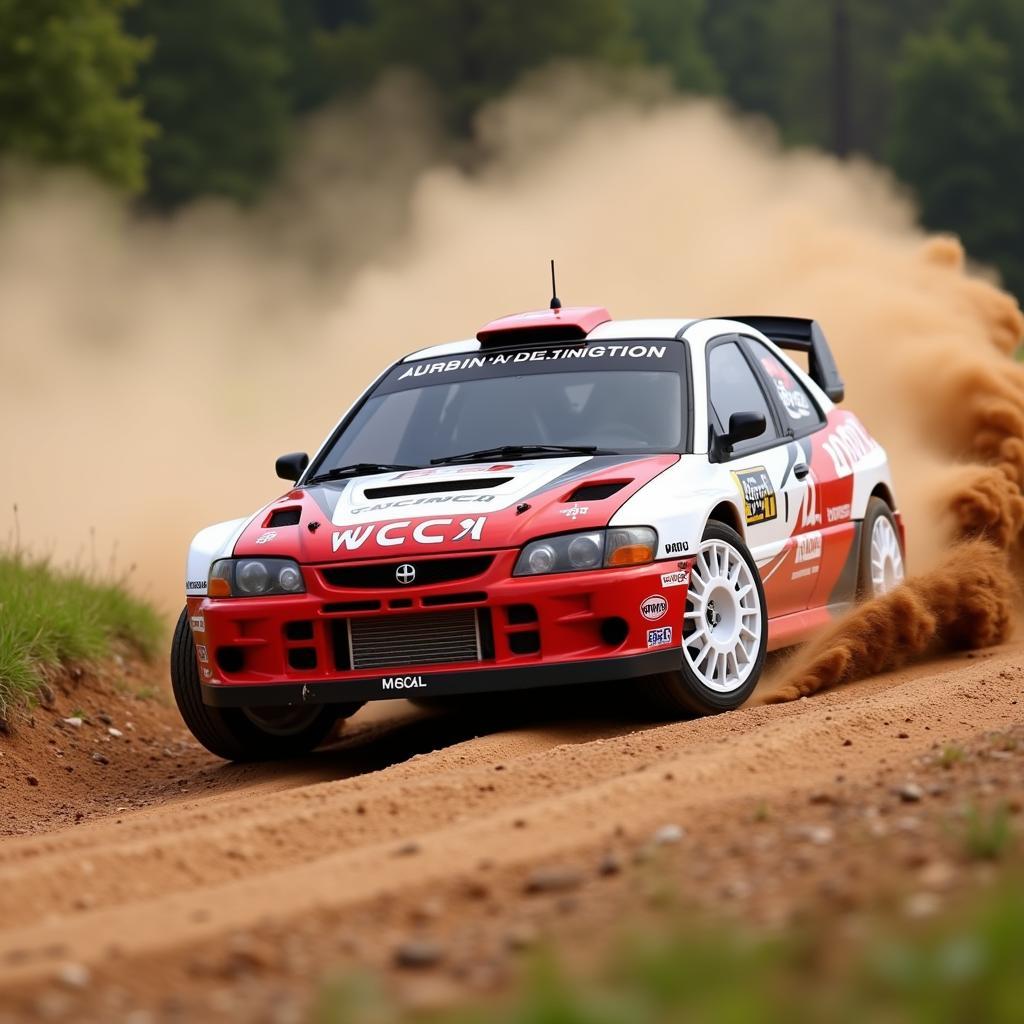Radio-controlled cars, or RC cars, have come a long way from simple toys. Today, they offer a thrilling blend of technology, speed, and precision, allowing enthusiasts to experience the adrenaline rush of racing from the comfort of their own backyard or dedicated tracks. Among the many RC car categories, World Rally Championship (WRC) cars stand out for their ruggedness, power, and ability to conquer diverse terrains.
 RC WRC car racing on a dirt track
RC WRC car racing on a dirt track
The Allure of RC WRC Cars
Rc Wrc Cars capture the essence of their full-sized counterparts, replicating the iconic designs and performance capabilities of rally legends. These scaled-down machines are built for speed, agility, and durability, ready to tackle challenging courses that mimic real-world rally stages.
What sets RC WRC cars apart is their ability to handle a variety of surfaces, from smooth tarmac to gravel, dirt, and even light off-road conditions. This versatility stems from their sophisticated suspension systems, powerful motors, and grippy tires, allowing drivers to push their limits and experience the thrill of rally driving.
Choosing the Right RC WRC Car
Selecting the perfect RC WRC car can be an exciting yet daunting task, given the wide array of models available. Here are key factors to consider:
1. Experience Level
-
Beginners: Opt for ready-to-run (RTR) models that come pre-assembled and ready to race out of the box. Look for cars with adjustable speed settings for a gradual learning curve.
-
Intermediate/Experienced Drivers: Explore kit or unassembled models, allowing for customization and tuning. These options offer greater control over the car’s performance and cater to specific driving styles.
2. Scale
RC WRC cars are typically available in various scales, with 1/10 and 1/8 being the most popular.
-
1/10 Scale: Offer a balance of performance, affordability, and maneuverability, making them suitable for both indoor and outdoor tracks.
-
1/8 Scale: Deliver raw power and speed, ideal for larger tracks and experienced drivers seeking a more demanding racing experience.
3. Features
Consider features like:
-
Motor Type: Brushed motors are generally more affordable and suitable for beginners, while brushless motors provide higher speeds and efficiency for experienced racers.
-
Battery Type: Nickel-cadmium (NiCd) batteries are budget-friendly but offer less runtime, while lithium-polymer (LiPo) batteries deliver longer runtimes and higher power output.
-
Drivetrain: Two-wheel drive (2WD) cars are suitable for beginners and offer a more tail-happy driving experience, while four-wheel drive (4WD) cars provide superior traction and control, especially on loose surfaces.
Maintaining Your RC WRC Car
Regular maintenance is crucial to keep your RC WRC car performing at its best.
-
Cleaning: After each run, remove dirt, debris, and moisture from the car, paying special attention to the chassis, suspension components, and wheels.
-
Inspection: Regularly inspect the car for any loose screws, damaged parts, or wear and tear. Replace any worn-out components promptly.
-
Battery Care: Properly charge and store your batteries according to the manufacturer’s instructions to maximize their lifespan and performance.
-
Lubrication: Lubricate moving parts such as the drivetrain, suspension arms, and steering linkages to reduce friction and ensure smooth operation.
Taking Your RC WRC Car to the Track
Once you’ve mastered the basics, unleash the full potential of your RC WRC car at a dedicated track.
-
Find a Local Track: Search for RC car clubs or tracks in your area. Most tracks cater to different skill levels and car classes, providing a welcoming environment for beginners and experienced racers alike.
-
Practice Makes Perfect: Spend time practicing on the track to familiarize yourself with its layout, jumps, and turns. Experiment with different driving lines and techniques to improve your lap times.
-
Join the Racing Community: Engage with fellow RC enthusiasts at the track. Share tips, learn from experienced racers, and immerse yourself in the camaraderie of the hobby.
Conclusion
RC WRC cars offer an exhilarating and rewarding way to experience the thrill of rally racing. Whether you’re a seasoned racer or just starting, these miniature machines deliver a potent blend of speed, agility, and excitement. Remember to choose the right car for your skill level, invest in proper maintenance, and most importantly, have fun unleashing your inner rally champion.
FAQs
1. What is the average cost of an RC WRC car?
The price range for RC WRC cars varies widely depending on the scale, features, and brand. Entry-level RTR models can start around $100, while high-end competition-grade cars can exceed $500 or more.
2. Where can I buy RC WRC cars?
RC WRC cars are available online from various retailers, as well as at hobby stores and some toy stores.
3. What is the best surface for racing RC WRC cars?
RC WRC cars are designed to handle various surfaces, but they generally perform best on dirt, gravel, and tarmac tracks that mimic real-world rally stages.
4. Are RC WRC cars difficult to control?
The ease of control depends on the car’s features, your experience level, and the track conditions. Beginner-friendly models offer adjustable speed settings and forgiving handling, while more advanced cars require greater skill and precision.
5. Can I upgrade my RC WRC car?
Yes, most RC WRC cars are highly upgradable. You can find a wide range of aftermarket parts, including motors, batteries, tires, and suspension components, to enhance your car’s performance and customize it to your liking.
Need help finding the perfect RC car for you? Contact us at Phone Number: 0902476650, Email: [email protected] Or visit us at: 139 Đ. Võ Văn Kiệt, Hoà Long, Bà Rịa, Bà Rịa – Vũng Tàu, Việt Nam. Our dedicated customer support team is available 24/7 to assist you.
Looking for more information on RC cars and other exciting hobbies? Check out our other articles on [Link to relevant article] and [Link to another relevant article].





